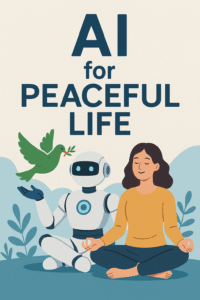By Dr. Thyagaraju GS | January 30, 2024
Dear readers of tocxten.com,
In the relentless pursuit of a meaningful and balanced life, we often find ourselves on a quest for inner peace. Today, let’s explore the profound teachings of Buddha, unravel the characteristics and advantages of a peaceful mind, delve into the concept of discipline, and understand how meditation, yoga, personal skills, and artificial intelligence contribute to transforming the mind into a sanctuary of tranquility.
Characteristics of a Peaceful Mind:
Buddha’s timeless wisdom guides us to understand the fundamental characteristics of a peaceful mind:
- Present Moment Serenity: “Do not dwell in the past, do not dream of the future, concentrate the mind on the present moment.” A peaceful mind finds its sanctuary in the now, untethered from the burdens of yesterday or the anxieties of tomorrow.
- Emotional Equilibrium: “Holding on to anger is like grasping a hot coal…” Emotional balance is the hallmark of a peaceful mind, allowing one to navigate the storms of life with grace and composure.
- Proactive Problem Solving: “Peace of mind is attained not by ignoring problems, but by solving them.” A peaceful mind faces challenges head-on, seeking solutions with clarity and resilience.
Advantages of a Peaceful Mind in Personal, Professional, and Education Life:
- Personal Life Harmony: A peaceful mind enriches personal relationships, fostering emotional well-being, and providing a foundation for meaningful connections.
- Professional Excellence: In the professional realm, a peaceful mind becomes a catalyst for effective decision-making, increased productivity, and a positive work environment.
- Academic Success: Students benefit profoundly from a peaceful mind, experiencing enhanced focus, better retention, and improved academic performance.
Methods to Achieve a Peaceful Mind:
- Mindfulness Meditation: “Peace comes from within. Do not seek it without.” Mindfulness meditation is a powerful tool to cultivate inner peace, fostering self-awareness and grounding the mind in the present.
- Yoga for Physical and Mental Harmony: Incorporating yoga practices not only nurtures physical health but aligns body and mind, promoting an internal environment conducive to peace.
- Cultivation of Personal Skills: Developing effective communication, time management, and resilience equips individuals to navigate life’s complexities, contributing to a peaceful mindset.
What is Discipline Mind and its Relationship with a Healthy, Happy, and Peaceful Life:
A disciplined mind is the compass guiding us toward a balanced life:
- Consistency and Self-Control: Discipline involves consistent habits and self-control, essential for maintaining a healthy, happy, and peaceful life.
- Personal and Professional Growth: A disciplined mind propels personal and professional growth, paving the way for fulfillment and a sense of purpose.
Role of Meditation, Yoga, Personal Skills, and Artificial Intelligence in Transforming Mind into Peaceful Mind:
- Meditation and Yoga: Both practices serve as transformative tools, fostering inner peace, mental clarity, and a holistic sense of well-being.
- Personal Skills Development: The cultivation of personal skills empowers individuals, promoting adaptability and resilience in the face of life’s challenges.
- Artificial Intelligence as a Catalyst: Mindful integration of artificial intelligence can alleviate mundane tasks, freeing up time for self-reflection, mindfulness, and contributing to the journey toward a peaceful mind. AI, when mindfully integrated, can significantly contribute to the journey toward a peaceful mind. Consider an AI-driven virtual assistant handling routine tasks, allowing individuals more time for self-reflection, mindfulness practices, or engaging in activities that bring joy and fulfillment.
- Example/Use Case: Consider a professional using an AI-driven task management system that learns their work habits. This system can automate repetitive tasks, streamline workflows, and provide insightful suggestions for better time management. With mundane tasks handled efficiently, the individual gains valuable time for relaxation, mindfulness, or pursuing personal interests, contributing to a more peaceful state of mind.
In conclusion, as Buddha beautifully encapsulated, “Peace is not merely a distant goal, but the journey we walk each day.” May this journey lead you to the tranquil recesses of your own mind, fostering a state of inner harmony that permeates every facet of your life.
Wishing you a journey filled with serenity and self-discovery,
Dr. Thyagaraju GS
Author, tocxten.com










